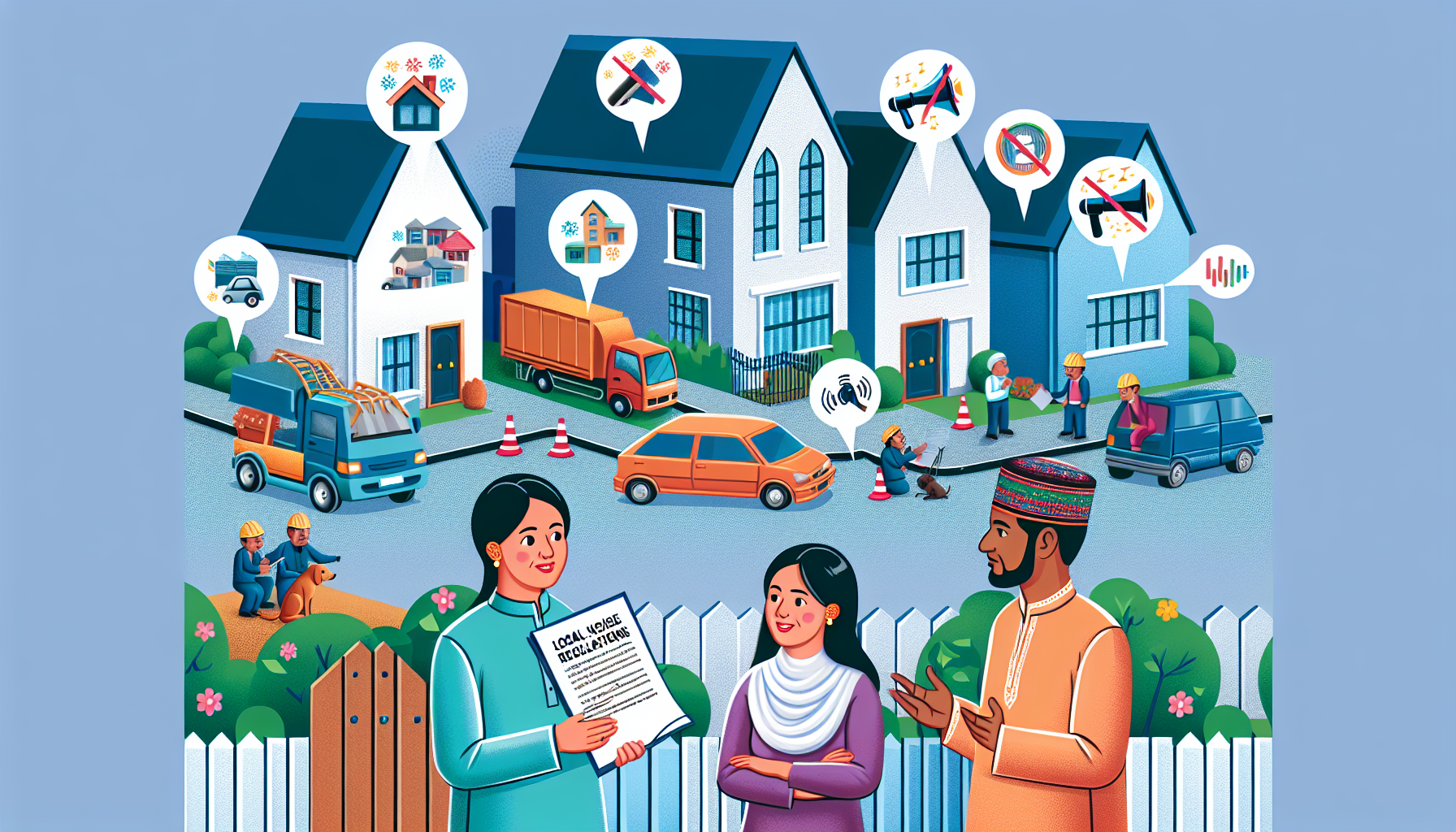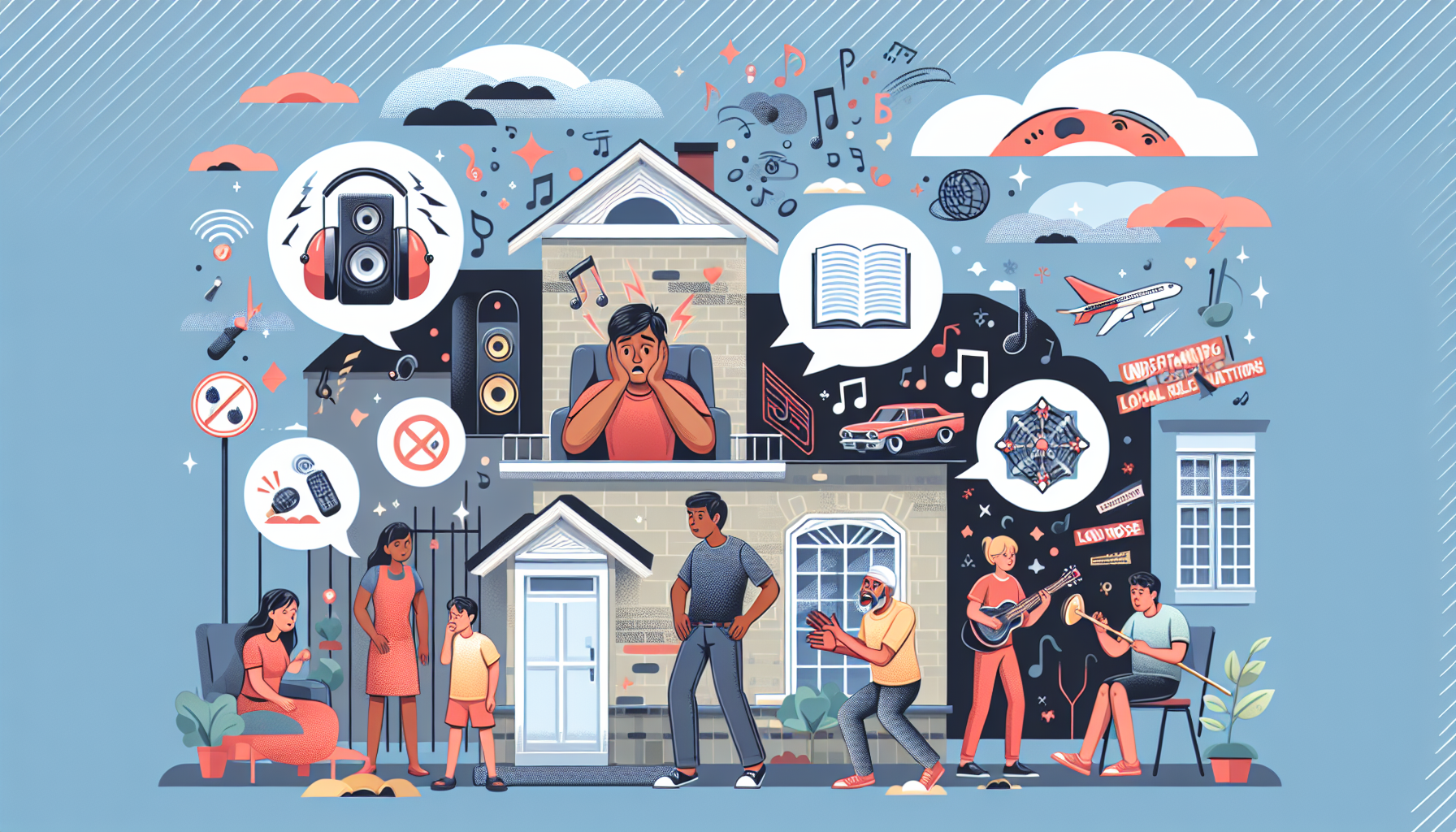Dealing with Noise Complaints in Residential Areas

Living in a residential area can be wonderful, but it also comes with its fair share of challenges. One common issue that many residents face is dealing with noise complaints. Whether it’s a loud neighbor, construction work, or even bustling streets, excessive noise can disrupt your peace and quiet. Fortunately, there are strategies you can employ to address these noise and disturbance issues effectively. In this article, we will explore some practical tips and suggestions to help you navigate and resolve noise complaints in your residential area.
Dealing with Noise Complaints in Residential Areas
Living in a residential area can be a peaceful and enjoyable experience, but sometimes noise disturbances can disrupt the serenity of your surroundings. Whether it’s a barking dog, loud music, or construction noise, dealing with noise complaints is essential to maintaining a harmonious living environment for everyone. In this article, we will explore the different aspects of noise pollution, the importance of addressing noise complaints, legal regulations and noise restrictions, steps to resolve noise complaints, communication and mediation strategies, implementing noise control measures, educating residents on noise etiquette, working with homeowners associations, the involvement of local authorities, and taking legal action if necessary.
Understanding Noise Pollution
Defining Noise Pollution
Noise pollution refers to excessive or unwanted sound that can have adverse effects on human health and the environment. It is a growing concern in urban areas where residents are exposed to various sources of noise on a daily basis.
Impact of Noise Pollution on Health
Excessive noise can have detrimental effects on physical and mental health. Prolonged exposure to high noise levels can cause stress, sleep disturbances, hypertension, and even cardiovascular problems. It can also have a negative impact on concentration, productivity, and overall quality of life.
Different Types of Noise Sources
Noise can emanate from a variety of sources, including traffic, industrial activities, construction sites, recreational activities, and even everyday household activities. Each source has its own unique characteristics and can contribute to the overall noise pollution in a residential area.
Understanding Decibels and Sound Intensity
Noise intensity is measured in decibels (dB), which is a logarithmic scale that quantifies sound levels. Different activities and sources produce varying levels of sound intensity. For example, a normal conversation typically has a sound intensity of around 60 dB, while a busy city street can reach levels of 80 dB or higher. Understanding these measurements can help in identifying noise sources and determining appropriate control measures.
Importance of Addressing Noise Complaints
Maintaining Peace and Quiet in Residential Areas
A peaceful living environment is fundamental to the well-being and happiness of residents. Addressing noise complaints ensures that the tranquility of a residential area is preserved, allowing individuals to relax, sleep, and enjoy their homes without constant disturbances.
Protecting the Well-being of Residents
Noise pollution can have severe health consequences, as previously mentioned. By addressing noise complaints promptly and effectively, the physical and mental well-being of residents can be safeguarded.
Preserving Quality of Life
Noise disturbances can significantly diminish the quality of life in a residential area. Living in constant noise can be stressful and frustrating, affecting one’s ability to unwind, concentrate, and enjoy recreational activities. By addressing noise complaints, the overall quality of life in the area can be improved.
Promoting Positive Neighborhood Relationships
Addressing noise complaints fosters positive relationships between neighbors. By handling complaints in a diplomatic and respectful manner, conflicts can be resolved, and a sense of community harmony can be maintained. Open communication and willingness to find mutually agreeable solutions are key to promoting positive neighborhood relationships.
Legal Regulations and Noise Restrictions
Understanding Local Noise Ordinances
Most residential areas have specific noise ordinances in place to regulate and control noise levels. It is crucial to familiarize yourself with these ordinances to understand your rights as a resident and the responsibilities of noise makers.
Identifying Permitted Noise Levels
Local noise ordinances typically specify the permitted noise levels during certain periods of the day or night. These levels are usually measured in decibels and vary depending on the type of area (residential, commercial, industrial) and the time of day.
Time Restrictions on Noisy Activities
Noise restrictions often include time limitations on noisy activities. For example, construction work may only be permitted between certain hours to minimize disruption to residents during nighttime or early morning hours.
Consequences for Violating Noise Regulations
Violation of noise regulations can result in penalties and fines. Repeat offenders may face escalating consequences, including legal action, suspension of permits, or even closure of businesses. Understanding the potential consequences can act as a deterrent and encourage compliance with noise regulations.
Steps to Resolve Noise Complaints
Encouraging Open Communication
One of the first steps in addressing a noise complaint is to encourage open communication between the parties involved. Approach your neighbor or the individual responsible for the noise disturbance in a friendly and non-confrontational manner. Express your concerns and try to understand their perspective as well.
Maintaining Calm and Respectful Discussions
During discussions about noise complaints, it is crucial to remain calm and respectful. Avoid getting defensive or aggressive, as this can escalate the situation further. Focus on finding a mutually agreeable solution rather than assigning blame.
Collecting Evidence of Noise Disturbance
In some cases, it may be necessary to gather evidence of the noise disturbance to support your complaint. This can include recording audio or video evidence, documenting the dates and times of the disturbances, and noting any other relevant details.
Reporting the Complaint to Appropriate Authorities
If direct communication and resolution attempts fail, it may be necessary to report the noise complaint to the appropriate authorities. This could be the local police department, the homeowner’s association, or any other entity responsible for enforcing noise regulations in your area. Provide them with all the evidence and information you have collected.
Communication and Mediation
Engaging in Constructive Dialogue
In cases where conflicts persist, engaging in constructive dialogue becomes vital. Mediation involves the impartial intervention of a third party, such as a professional mediator or a representative from the homeowner’s association, to facilitate discussions between the parties involved. Mediation can often lead to finding mutually acceptable solutions.
Finding Compromise and Mutual Solutions
In mediation, the focus is on finding a compromise that satisfies both parties. This may involve negotiating noise-reducing measures, adjusting the timing or duration of noisy activities, or exploring alternative solutions that mitigate the impact on the complainant while still allowing the noise maker to pursue their activities.
Keeping a Record of Agreements
Once an agreement or compromise has been reached, it is essential to keep a record of the agreed-upon terms. This can help prevent future misunderstandings or disputes and provide a reference point if further action needs to be taken.
Implementing Noise Control Measures
Identifying Noise Sources and Mitigation Strategies
To effectively address noise disturbances, it is crucial to identify the specific sources of noise and develop appropriate mitigation strategies. This may involve conducting noise source assessments, which can be done by professionals if necessary, and implementing targeted measures to reduce noise emissions.
Installing Soundproofing Materials
Installing soundproofing materials is an effective way to reduce the transmission of noise within and between buildings. This can include adding insulation in walls, floors, and ceilings, using double-glazed windows, sealing gaps and cracks, or even applying sound-absorbing panels to walls or ceilings.
Using Noise Barriers and Insulation
In outdoor settings, noise barriers and insulation can be used to block or deflect noise sources. These barriers can be constructed using materials like concrete, wood, or metal and strategically placed to create a physical barrier between the noise source and the affected area.
Regular Maintenance of Noisy Equipment
Regular maintenance of noisy equipment, such as machinery, HVAC systems, or pool pumps, is essential to minimize noise emissions. Ensuring that equipment is in good working order and properly maintained can significantly reduce noise disturbances.
Educating Residents on Noise Etiquette
Raising Awareness about Noise Impact
Educating residents about the impact of noise pollution is crucial to fostering a culture of noise awareness and responsibility. By raising awareness about the negative effects of noise and the importance of respectful noise etiquette, residents can make more informed decisions regarding their own actions and be more considerate towards their neighbors.
Sharing Noise Reduction Tips
Providing residents with practical tips on how to reduce noise in their everyday activities can go a long way in minimizing noise disturbances. Simple measures like closing windows, using headphones instead of playing music aloud, or choosing quieter appliances can make a significant difference.
Providing Resources and Guidelines
Developing and distributing resources and guidelines on noise etiquette can help residents understand how to mitigate noise disturbances. These resources can include brochures, websites, or community newsletters that outline best practices for noise control in residential areas.
Organizing Community Outreach Programs
Organizing community outreach programs focused on noise awareness can help bring residents together and promote positive change. These programs can include workshops, seminars, or guest speakers who share their expertise on noise pollution and ways to address it effectively.
Working with Homeowners Associations
Collaborating with HOAs to Address Noise Concerns
Homeowners associations (HOAs) play a crucial role in maintaining the quality of life in residential areas. Collaborating with HOAs to address noise concerns can lead to more effective enforcement of noise regulations and a greater sense of community responsibility.
Establishing Noise Monitoring Systems
Implementing noise monitoring systems within the community can help HOAs identify and address noise disturbances. These systems can include the use of noise meters or sensors strategically placed in common areas to monitor noise levels and ensure compliance with established regulations.
Developing Noise Policies and Guidelines
HOAs can develop and enforce noise policies and guidelines specific to their residential community. These policies can outline permitted noise levels, time restrictions, and consequences for violating noise regulations. Clear guidelines help set expectations and facilitate the resolution of noise complaints.
Providing Support and Resources to HOAs
Municipalities and local authorities can provide support and resources to HOAs in their efforts to address noise complaints. This can include training sessions, educational materials, or access to professional advice on noise control measures.
Involvement of Local Authorities
Local Authorities as Mediators and Enforcers
Local authorities, such as the police department or noise control agencies, are responsible for enforcing noise regulations and mediating noise-related disputes. In cases where resolution attempts have failed, involving local authorities may be necessary to ensure compliance with noise regulations.
Collaboration with Local Authorities
Collaborating with local authorities can help homeowners associations and residents navigate the process of reporting and resolving noise complaints. Local authorities can provide guidance on the appropriate channels to report complaints, offer mediation services, and take necessary legal action when required.
Taking Legal Action if Necessary
Seeking Legal Advice and Consultation
If all attempts at resolving noise complaints through communication, mediation, and community involvement have been exhausted, seeking legal advice and consultation is recommended. A legal professional specializing in noise regulations can provide guidance on the viability of taking legal action and the possible outcomes.
Collecting Sufficient Evidence
To successfully pursue a legal case regarding noise disturbances, it is essential to collect sufficient evidence. This may include video or audio recordings, witness testimony, or other documentation that supports your claims of ongoing noise disturbances and the resulting impact on your quality of life.
Filing a Lawsuit against the Noise Offender
If the evidence is substantial and the noise offender refuses to comply with regulations or reach a resolution, filing a lawsuit may be the next step. Legal action can seek injunctions to cease the noise disturbance, damages for the harm caused, or other appropriate remedies based on local laws.
Attending Court Hearings and Presenting the Case
If the noise complaint progresses to a court hearing, it is important to attend and present your case. This involves providing your evidence, explaining the impact of the noise disturbance on your well-being, and demonstrating that you have made reasonable efforts to resolve the issue amicably.
In conclusion, addressing noise complaints in residential areas is essential for maintaining a peaceful and harmonious living environment. By understanding noise pollution, adhering to legal regulations, following the appropriate steps to resolve complaints, and promoting open communication and education, residents can work together to mitigate noise disturbances and preserve the quality of life in their communities. Collaboration with homeowners associations and local authorities, along with the willingness to take legal action if necessary, ensures that noise issues are effectively addressed and resolved. Remember, a considerate and respectful approach goes a long way in fostering positive neighborhood relationships.












